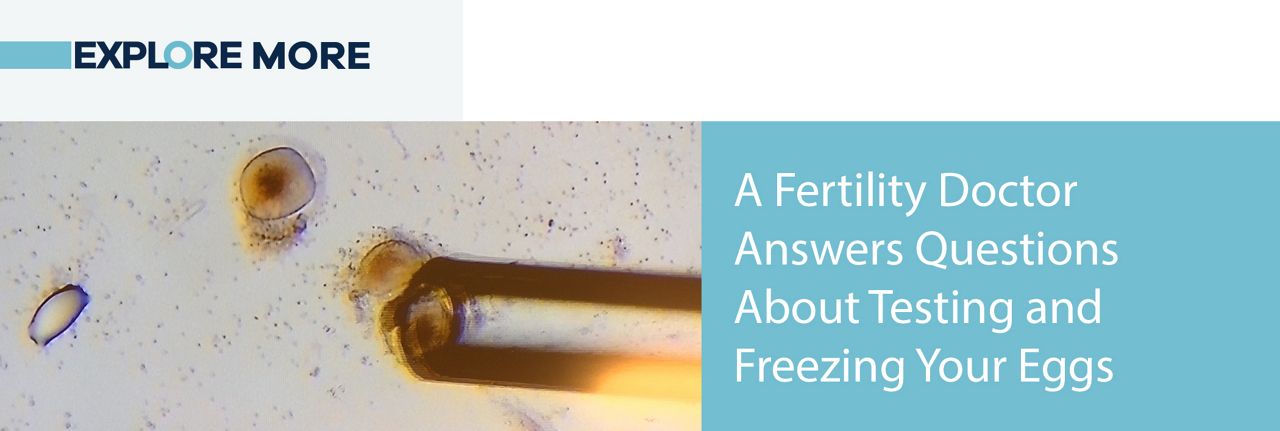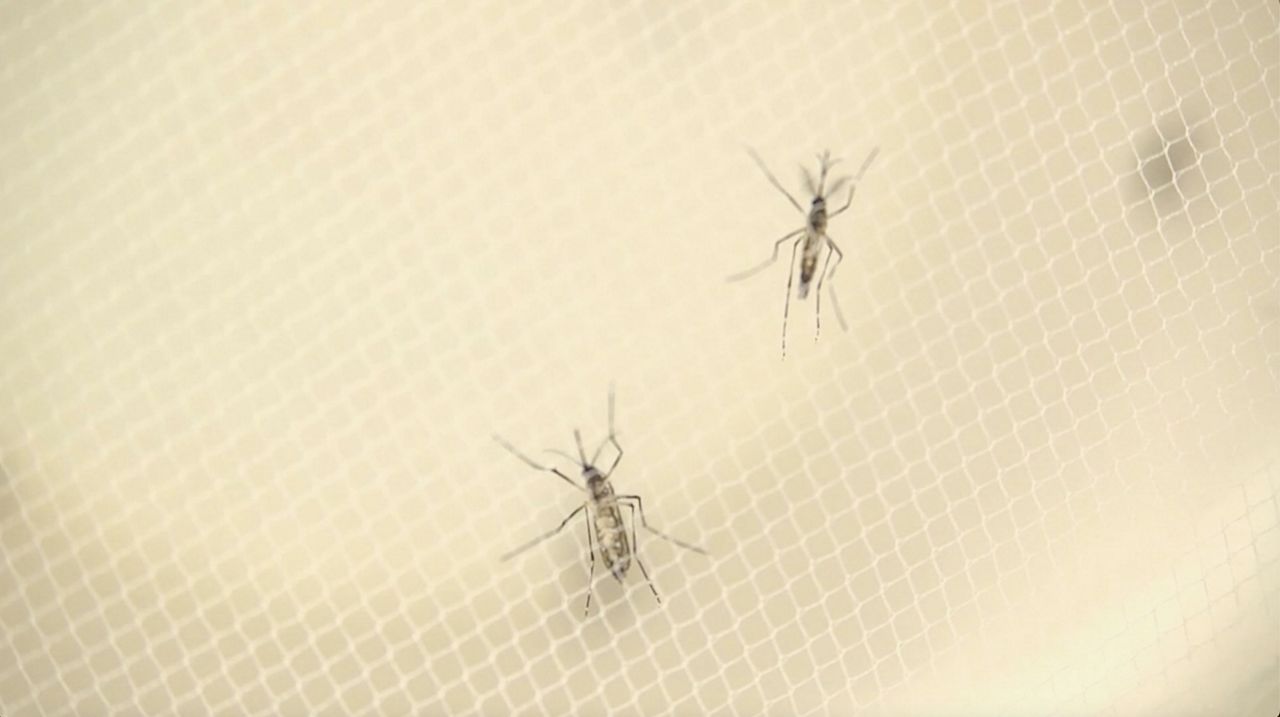The first episode of Exploring Your Health looks at the prevalence of infertility and the cost and accessibility of in vitro fertilization. In episode 5, we’re asking the follow-up question; is there more that can be done to help women plan better and earlier for pregnancy and is egg freezing all it is cracked up to be? For answers, we sought out the experts. Our first stop was Rutgers Robert Wood Johnson Medical School, where we met with the director of the Women’s Health Institute, Dr. Gloria Bachmann.
Current counseling guidelines from the American College of Obstetricians and Gynecologists (ACOG) recommends OBGYNs begin pre-pregnancy planning conversations with one simple question; “Would you like to become pregnant in the next year?” If the patient says yes, there is a lot of ground to cover, but if the answer is no, the discussion often shifts to contraception, not long terms plans for family building.
“Many women, every year when they see their provider they may talk about OK, these are my plans over the next year, never thinking in the future that, yes, I would like to get pregnant at some point,” said Bachmann.
It can be an uncomfortable conversation for some, especially for women who are nowhere near ready to start their families, and can be a painful one for those who are ready but haven’t found the right partner yet.
Because life doesn’t always go according to plan, Bachmann says it is necessary to have more frank discussions, earlier on, about fertility. “The planning of the pregnancy should not be when the woman decides I would like to get pregnant for next year,” said Bachmann, “planning for pregnancy should be 10 years, 15 years from now.”
While infertility impacts men just as often, we have to focus here on women because age plays a much more significant role in a woman’s ability to get pregnant.
The number of women starting their families at 35 or older is nine times that of 40 years ago.
In New York, the number of women having children between the ages of 40 and 44 increased 60 percent from 1995 to 2017. In that same time frame, there was a more than 20 percent decrease in women having children between the ages of 25 and 29.
Ultimately, most women won’t have problems conceiving, but it’s fair to say, a growing number will - as more people start their families later.
“It's not a negative message when we say that the longer a woman waits, the possible risk factors that will adversely affect her fertility may happen to her. But it's a fact,” says Bachmann.
Greater pre-pregnancy guidance may not exist, because there really haven't been meaningful alternatives for women until now.
Options to preserve fertility have only just recently increased with vitrification- the ultra-rapid cooling of eggs. It has been proven more effective than previous techniques.
The American Society of Reproductive Medicine removed the experimental label on vitrification in 2012.
THE EGG FREEZING BOOM
In 2017 Reproductive Endocrinologist Joshua Klein launched Extend Fertility in Manhattan.
Then, the first egg-freezing-only clinic in the country. “In general, 2015, 2016, when we were kind of getting our pieces together to open, there were probably between five and eight thousand egg freezing cycles being performed per year,” said Klein. “If you actually wind the clock five years prior to that, was maybe only a few hundred in the nation per year. So it's grown pretty exponentially in that timeframe.”
Klein said Extend and other fertility centers are seeing an increase in egg-freezing patients, because women want more control. “I think the key point is that the most appropriate time biologically to have children or to plan a family is in a woman's 20s. But the world we live in makes that very difficult for lots of reasons. And so there's really this mismatch between the biological clock and the world we live, in societal pressures, relational challenges, economic pressures, career advancements, all sorts of things. What we know is that in the last half century most of education around fertility has centered around contraception,” said Klein.
Victoria “Vix” Reitano, knew she wanted more time, and taking a birth control pill didn't go far enough. She started making plans to freeze her eggs when she was 18, at that time, she couldn’t get a doctor to do it for her. “I actually had one doctor a gynecologist on the Upper East Side who wouldn't even let me get an IUD because I was not in a relationship. I lost it that day in the paper gown. I was fuming,” said Vix.
After starting her creative media agency called Six Boro Social at 27, she decided she would freeze her eggs at Extend, when she turned 29. “I know that the earliest I want to have kids is in my late thirties,” said Vix. “Now maybe when I get to 34 or 35, maybe I will change my mind. But I don't want to have to make a rush decision based on an outside force. So I don't think that doctors are really having this conversation with us because to them it's ‘she's crazy. She's just being like overly cautious’.”
The process of freezing eggs, is quite a commitment. Vix took daily hormone injections for ten days straight. It is an intense emotional rollercoaster, as the medications work to stimulate egg growth. But Vix says at the end of it, she was excited, “I felt like I had more time. I felt like when everything was completely done from a mental perspective I was like this is great. Then I found out that I only had seven mature eggs that were frozen. And that was a little bit of a letdown for me because they had extracted 15.”
Dr. Bachman wrote an article in the March 2018 issue of the Journal of Women’s Health, pushing for more counseling around egg freezing, part of a long term pre-pregnancy planning conversation. “I think egg freezing is a good thing for women. It’s another opportunity that we have to utilize our bodies for future pregnancy, if a pregnancy is not feasible at that time,” she said. “But there are many obstacles to that as well. It depends on how old a woman is. There's the financial aspects. It's not just the point where I, Gloria Bachmann go in and have my egg cells retrieved. There is a cost at that time, there is also a yearly storage cost to this, and not every cycle is a successful cycle.”
Each cycle costs between $6,000 to $10,000. Egg freezing is covered by just five percent of employers, according to Mercer, a benefits consulting company. Among companies of 20,000 or more employees, 10 percent cover egg freezing.
It is considered elective, something Bachmann says should change, “I do not see this as an elective procedure. There are many factors in a woman's life at 21, 31, even a 41 where she may not be able to get pregnant or she's thought healthy enough to get pregnant at that point.”
TESTING OVARIAN RESERVE
Delay in counseling woman about their future fertility, and even the lag in insurance coverage, may lie in the fact that there are still a lot of unknowns. Take the anti mullerian hormone, or AMH, it’s an indicator of a woman's ovarian reserve. You can measure AMH levels, but recent studies show the test is not an accurate predictor of future fertility. Yet, it is a test women commonly rely on as they decide whether to freeze their eggs.
“There is some controversy here, but the weight of the literature really suggests that AMH hasn't reached its prime time,” said Dr. Amanda Kallen, an Assistant Professor with Yale School of Medicine’s Reproductive Endocrinology and Infertility Division.
Just this April ACOG released a Committee Opinion, co-authored by Kallen, advising OBGYNs not to use the AMH test to help determine a women’s ability to conceive. “AMH is really most clinically useful as a predictor of how someone will respond to IVF, “ said Kallen. “When you try and hold it to this test of; Does it predict my future fertility if I'm not infertile now? It doesn't sort of seem to hold the same weight and predictive value as when we use it for its true intended purpose, which is - if I give someone IVF medications how many eggs can I get from that patient?”
Kallen says having a low AMH isn’t a prediction of whether someone will be infertile in the future. Inversely, a high AMH doesn’t mean a woman won’t have problems later on. Kallen says a low AMH… “suggests that the basket is emptier than it should be. But if at 20 and I have a half a million eggs and I should have a million, clinically does that really matter?” It may not matter, because if most of her eggs are healthy, she’ll have no problem getting pregnant. The question women really need answered as we plan for future pregnancy is - are the majority of my eggs good quality? and there’s no test for that. (potential pull quote)
“Egg freezing is a great option. It's not a guarantee, that those eggs will be useful in the future. And when I have women come in and talk about freezing eggs,” said Kallen, “I will tell them that if they freeze eggs the best thing to do is then proceed as though the eggs aren't frozen. So freeze them and forget about them, rather than using frozen eggs as a way to potentially postpone fertility.
Other things to think about; there is still no determined "shelf-life" for frozen egg cells and no long-term studies that shed light on potential health effects for the offspring. The bottom line, Kallen says, is a woman with no known infertility should not feel pressured to make a significant financial investment based on a low or high AMH score.
Yale School of Medicine has fertility clinics and offers fertility preservation services, including egg freezing. Still Kallen says women should be wary of companies pushing them to test their AMH. “It's there it's an option. People should know about it. They should know about the pros and cons,” she said. “But, I think that to induce, sort of panic about an AMH, or panic about the need to freeze eggs, when many women who freeze eggs will not go on to use those eggs. That’s farther than I’d like to go.”
PERSONAL ADVOCACY AND AWARENESS
Vix may do another cycle eventually, but says she’ll have to gear herself up, once again, for what she calls the hormonal trauma. She does see it though, as a sort of insurance policy. “We're still paying student loans, because we graduate with a mortgage - like we start life with a mortgage. So then that means that everything has to be delayed, whether or not we are career focused, because the money just isn't there,” said Vix. “You know it's expensive to have a kid.”
It is also a tremendous responsibility she says she is not quite ready for yet. So far now, Vix says egg freezing is a way for her to have a say in her future. “Options are what give us freedom. And I think that if we can have more of these conversations, then women will feel empowered.”
In 2018 the American Society of Reproductive Medicine came out with specific counseling guidelines for women interested in egg freezing, but there are no national recommendations, for doctors to broach this conversation with women, unless they have cancer or a disorder that may damage their egg supply. So it is up to women, to start the conversation with their health care providers.
In the meantime, we do know that maintaining a healthy weight and not smoking helps to preserve egg quality.









